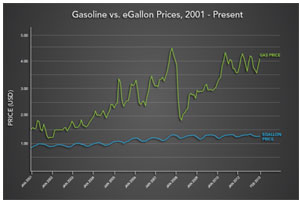Governors of eight states are coming together to get more electric vehicles (EVs) on the road, agreeing to a target of 3.3 million zero emission vehicles by 2025.
Not surprisingly, the states are: California, Oregon, Maryland, New York, Connecticut, Massachusetts, Rhode Island and Vermont. They account for almost 25% of the US car market.
They signed a pact to develop joint policies that can increase electric, plug-in and hydrogen car sales, and agreed to draft an implementation plan within six months.
"This is not just an agreement, but a serious and profoundly important commitment," says California’s Governor Jerry Brown. "From coast to coast, we’re charging ahead to get millions of the world’s cleanest vehicles on our roads."
They plan to harmonize building codes to make it easier to add EV charging stations and are considering other measures such as giving car owners favorable electric rates for charging at home and other financial incentives; buying vehicles for government fleets; and allowing EVs to use the HOV lane in all 8 states.
California just passed two laws that facilitate EV use: one law modifies the building code so that all multi-family homes, businesses and shopping centers must have EV chargers. Palo Alto just voted to require wiring for EVs in all new homes.
Because of California’s zero emissions law (1.4 million vehicles by 2025) and strong rebate incentives, almost 30% of the 165,000 EVs that have been sold in the US are in that state, and it’s expected to dominate sales through 2020. Each of the 8 states have also adopted policies requiring that a percentage of cars sold be zero emissions by 2025.
Will they adopt California’s cap-and-trade for EVs program?
Automakers strongly support the agreement. "3.3 million cars is not an achievable goal given what we’re doing today from an infrastructure investment standpoint. It’s just not," Dan Gage of the Alliance of Automobile Manufacturers told Denver Post.
Not only is this move important for climate change mitigation, it will boost state economies. It costs two-thirds less to charge a car than to fuel with gasoline, saving people about $6000 over the life of a car. It also makes those states more attractive to a growing industry, as Los Angeles has noticed.

So far this year, 59,000 EVs have sold, more than in all of 2012.
